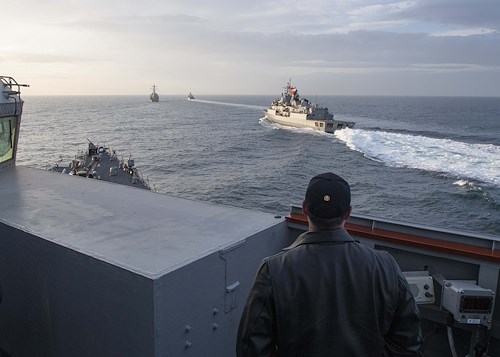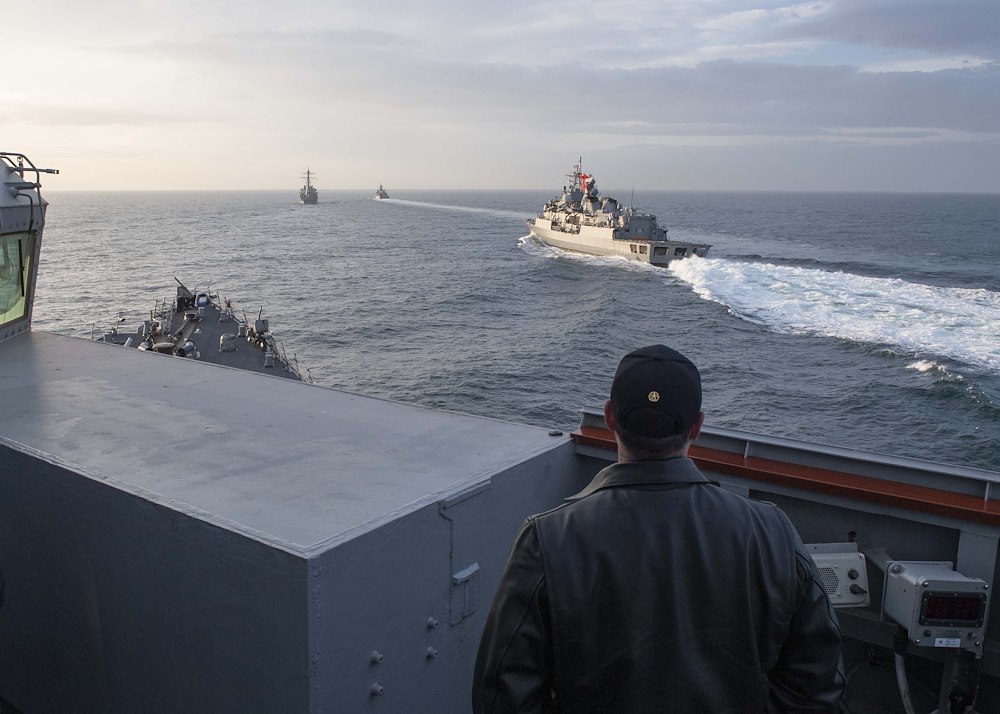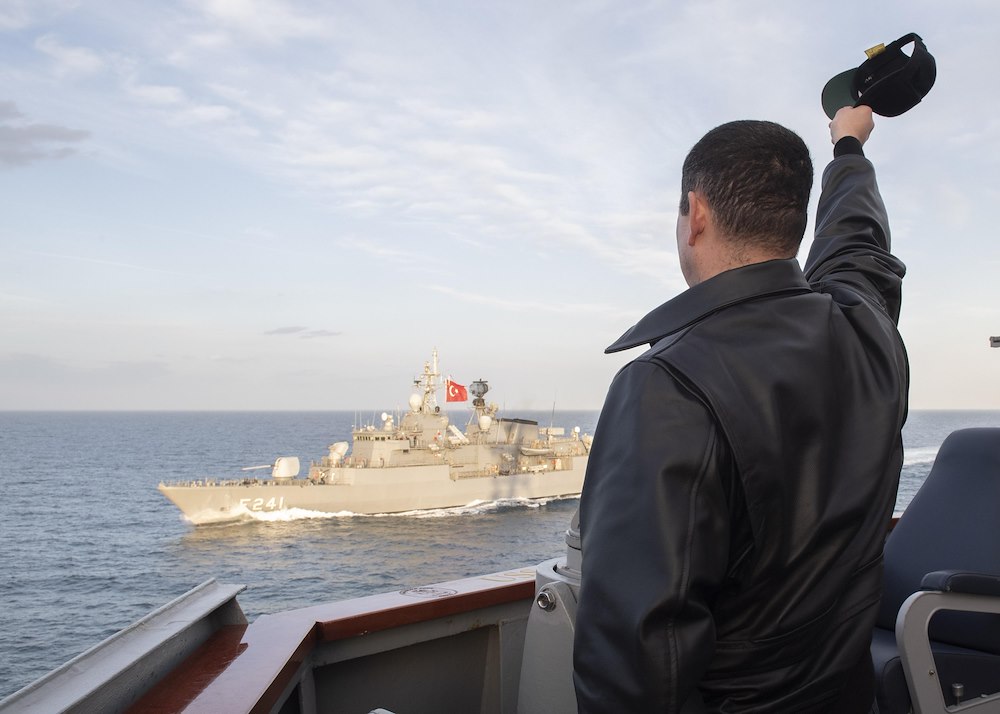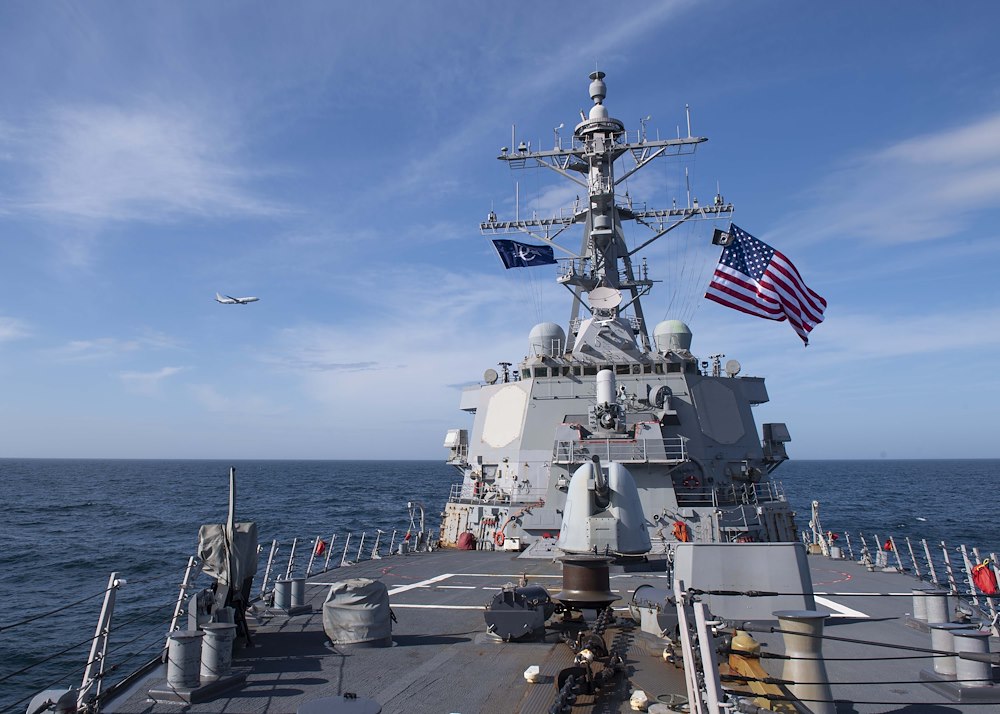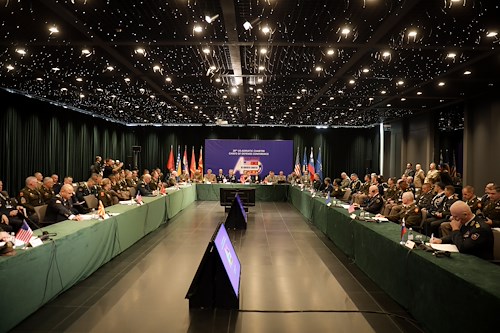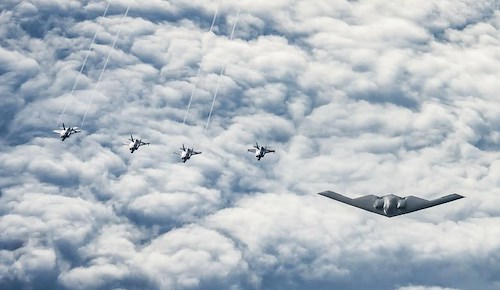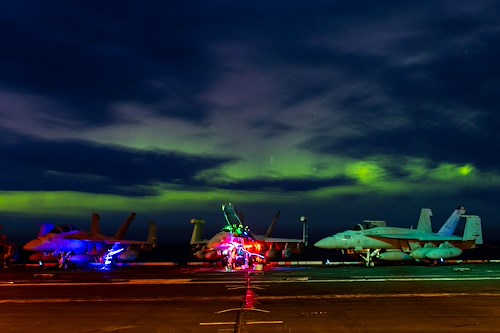Gallery contains 3 images
×
Photo 1 of 3
210209-N-RG171-0354
BLACK SEA (Feb. 9, 2021) Cmdr. Matthew Curnen, commanding officer of the Arleigh Burke-class guided-missile destroyer USS Donald Cook (DDG 75), watches as the Turkish navy Yavuz-class TCG Turgutreis (F-241), middle, and the Turkish navy Barbaros-class frigate TCG Orucreis (F-245), right, participate in a passing exercise with the Donald Cook and the Arleigh Burke-class guided-missile destroyer USS Porter (DDG 78) in the Black Sea, Feb. 9, 2021. Donald Cook, forward-deployed to Rota, Spain, is on patrol in the U.S. Sixth Fleet area of operations in support of regional allies and partners and U.S. national security in Europe and Africa. (U.S. Navy photo by Mass Communication Specialist 3rd Class Will Hardy/Released)
Photo by: Mass Communication Specialist 3rd Class Will Hardy
Photo 2 of 3
210209-N-RG171-0319
BLACK SEA (Feb. 9, 2021) Cmdr. Matthew Curnen, commanding officer of the Arleigh Burke-class guided-missile destroyer USS Donald Cook (DDG 75), waves to the Turkish navy Yavuz-class TCG Turgutreis (F-241) during a passing exercise in the Black Sea, Feb. 9, 2021. Donald Cook, forward-deployed to Rota, Spain, is on patrol in U.S. Sixth Fleet in support of regional allies and partners and U.S. national security in Europe and Africa. (U.S. Navy photo by Mass Communication Specialist 3rd Class Will Hardy/Released)
Photo by: Mass Communication Specialist 3rd Class Will Hardy
Photo 3 of 3
210209-N-RG171-0260
BLACK SEA (Feb. 9, 2021) A Boeing P-8 Poseidon flies over the Arleigh Burke-class guided-missile destroyer USS Donald Cook (DDG 75) during a photo exercise in the Black Sea, Feb. 9, 2021. Donald Cook, forward-deployed to Rota, Spain, is on patrol in the U.S. Sixth Fleet area of operations in support of regional allies and partners and U.S. national security in Europe and Africa. (U.S. Navy photo by Mass Communication Specialist 3rd Class Will Hardy/Released)
Photo by: Mass Communication Specialist 3rd Class Will Hardy
The Arleigh Burke-class guided-missile destroyers USS Donald Cook (DDG 75), USS Porter (DDG 78), and a U.S. Navy P-8A from Patrol Squadron (VP) 46 participated in joint air and surface exercises with Turkish frigates TCG Orucreis (F 245) and TCG Turgutreis (F 241), and two Turkish F-16 fighters alongside reconnaissance aircraft in the Black Sea, Feb 9, 2021.
The U.S. Navy ships and aircraft joined the Turkish maritime forces in an integrated surface, air, subsurface warfare exercise. These maneuvers enhanced the tactical proficiency of the ships and aircraft through precision command and control and communication.
“We welcome this opportunity for American Navy ships USS Donald Cook and USS Porter to conduct exercises with the Turkish armed forces in the Black Sea,” said U.S. Ambassador to Turkey David Satterfield. “As NATO Allies, we share a commitment to peace and stability in Europe and the Middle East. Joint exercises build confidence, improve communications and reinforce our already strong security partnership in the Black Sea and the wider region.”
The four surface ships met in the Black Sea early in the morning to prepare for a full day of interoperability, demonstrating the U.S. Navy’s continued commitment to Turkey and NATO cooperation in the region.
“Turkey is a highly valued Ally and NATO maritime partner, whose joint operations with the U.S. Navy in the Black Sea reinforce the asymmetric advantage of the NATO Alliance,” said Vice Adm. Gene Black, commander, U.S. Sixth Fleet and commander, Naval Striking and Support Forces NATO. “Our ability to collaborate and operate together is based on the solidarity and strength of NATO, which enables stability in the maritime domain.”
First, two Turkish F-16 Fighting Falcons joined the U.S. and Turkish ships to perform an air defense exercise, where aircraft controllers onboard each ship strategically maneuvered the aircraft above. Next, the ships performed a series of tactical maneuvers, practicing precise communication and stationing skills. Finally, the group ended the day by deploying a simulated submarine and hunting for it. A U.S. P-8 Poseidon joined to practice cooperative Anti-Submarine warfare, in which surface ships utilize air assets to expand submarine searches.
“It was an honor and a pleasure to work with the Turkish Navy during today’s exercises,” said Cmdr. Matthew Curnen, commanding officer of Donald Cook. “Our Turkish counterparts are clearly well-trained professional mariners, and both sides gained valuable tactical experience in just a short time.”
The exercise provided operational proficiency in anti-submarine warfare and anti-surface warfare in order to enhance overall multi-lateral operations among NATO Allies.
Donald Cook and Porter entered the Black Sea Jan. 23 and 28, respectively. The two Forward Deployed Naval Forces - Europe (FDNF-E) have operated in the Black Sea with USNS Laramie, and NATO Air Command aircraft E-3A Airborne Warning and Control System (AWACS).
The U.S. Navy routinely exercises high-end warfare with NATO Allies and partners. The Turkish Navy is a professional and proficient maritime force that the U.S. Navy routinely works with to ensure regional stability and peace. Multinational training enhances interoperability, allowing us to maintain the vigilance necessary to promote a secure and prosperous region.
The Black Sea is a critical waterway for maritime commerce and stability throughout Europe. The U.S. Navy routinely operates in the Black Sea to work with our NATO Allies and partners, including Bulgaria, Georgia, Romania, Turkey, and Ukraine.
The U.S. Navy routinely operates ships in the Black Sea consistent with the Montreux Convention and International Law.
Porter and Donald Cook are two of four U.S. Navy destroyers based in Rota, Spain, and assigned to Commander, Task Force 65 in support of NATO’s Integrated Air Missile Defense architecture. These Forward-Deployed Naval Forces-Europe ships have the flexibility to operate throughout the waters of Europe and Africa, from the Cape of Good Hope to the Arctic Circle, demonstrating their mastery of the maritime domain.
U.S. Sixth Fleet, headquartered in Naples, Italy, conducts the full spectrum of joint and naval operations, often in concert with allied and interagency partners, in order to advance U.S. national interests and security and stability in Europe and Africa.

